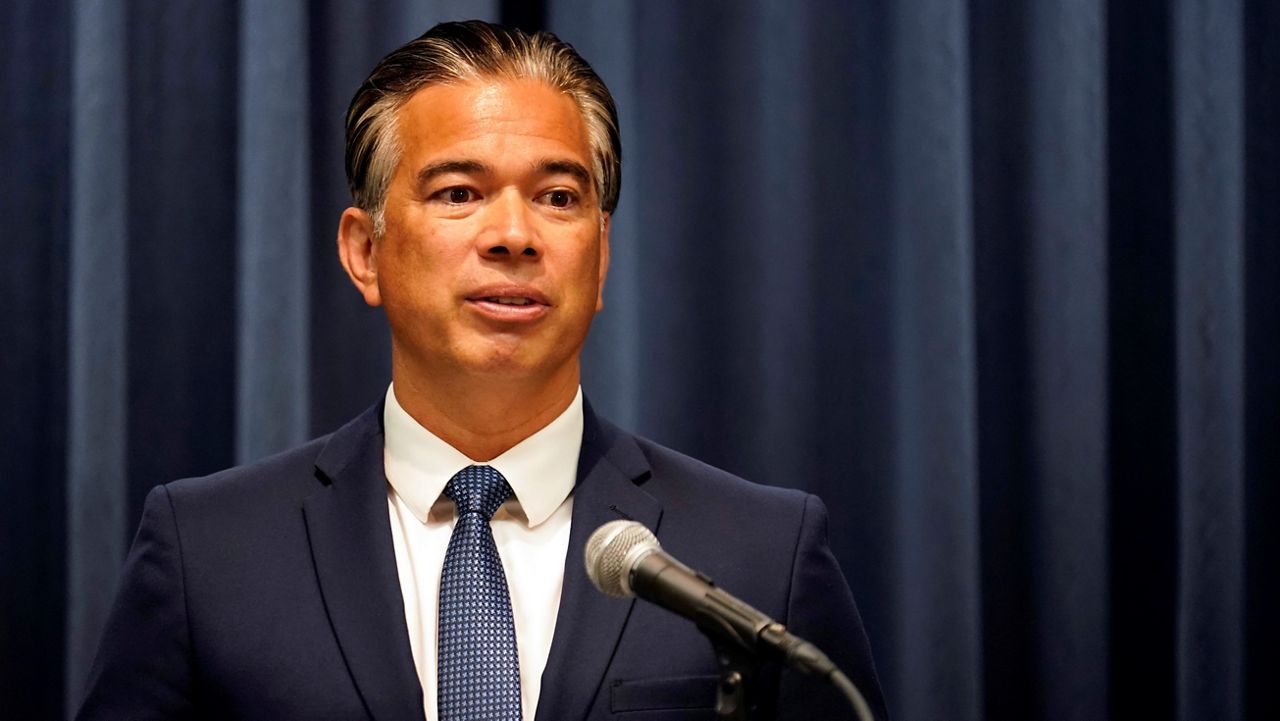SANTA ANA, Calif. (AP) — California's attorney general sued a Southern California school district Monday over its new policy requiring schools to notify parents if their children change their gender identification or pronouns, the latest blow in an intensifying battle between a handful of school districts and the state about the rights of trans kids and their parents.
Attorney General Rob Bonta said policies like the one adopted by Chino Valley Unified School District will forcibly out transgender students and threaten their well-being. But the district's board president and supporters say parents have a right to know the decisions their children are making in schools.
Bonta is seeking a court order to immediately block the policy in Chino Valley, a district about 35 miles east of Los Angeles, which requires schools to notify parents within three days if employees become aware a student is asking to be treated as a gender other than the one listed on official records.
“For far too many transgender children and gender nonconforming youth, school serves as their only safe haven — a place away from home where they can find validation, safety, privacy. We have to protect that,” he said. He argued that the policy discriminates against the students and violates the state constitution’s requirement of equal protection for all.
A couple of nearby districts have adopted similar policies and at least one more is considering doing so. The moves have stoked fierce debates at local school board meetings amid an intense national conversation over transgender rights as other states have sought to impose bans on gender-affirming care, bar trans athletes from girls and women’s sports, and require schools to “out” trans and nonbinary students to their parents.
In California, the proposals are coming from communities that have elected more conservative school board members since the COVID-19 pandemic, putting them increasingly at odds with Gov. Gavin Newsom and the other Democrats who dominate the state's political leadership.
Among them is Chino Valley Unified President Sonja Shaw, who said the lawsuit was no surprise as state officials have repeatedly taken steps “to shut parents out of their children's lives.”
“We will stand our ground and protect our children with all we can because we are not breaking the law,” Shaw said in a text message. “Parents have a constitutional right in the upbringing of their children. Period.”
The notification policies aren't the only battle between local schools and California officials over LGBTQ policies. Earlier this year, Newsom threatened to fine the Temecula Valley Unified School District after it rejected an elementary school social studies curriculum that included books mentioning politician and gay rights advocate Harvey Milk. The district later reversed course on the curriculum decision.
State lawmakers are considering legislation aimed at ensuring school curricula reflects gender, racial and cultural diversity. The bill would require the California Department of Education to release guidance on managing conversations about race and gender at school.
Earlier this month, Newsom said state lawmakers also were drafting legislation to address policies to notify parents that their child changed their gender identity. But Assemblymember Chris Ward, vice chair of the California Legislative LGBTQ Caucus, said they won’t introduce the legislation this year.
“Recognizing the nuance and complexity of this work, we are continuing to refine our legislative approach. . . to ensure the most comprehensive and responsible legislation is proposed,” Ward, a Democrat representing San Diego, said in a statement.
The parental notification policies began cropping up after Republican state lawmaker Bill Essayli proposed a statewide bill on the issue that never received a hearing in Sacramento. He then shifted focus and started working with local school board members like Shaw and the California Family Council to draft the notification policy that was voted on in Chino Valley.
Temecula Valley and Murrieta Valley have also adopted similar policies, and Orange Unified is debating it.
“There’s a lot of systems in place to deal with physical abuse of any minor, and I think it’s wrong for the state to presume that parents are a danger and therefore take a blanket policy where they’re going to withhold information from all parents under the auspice that some parents might be harmful to their kids,” Essayli said.
But Jody Herman, a public policy scholar at the University of California Los Angeles School of Law, said requiring school staff to notify parents if their child identifies as trans is taking a “gamble” with someone’s life. Herman pointed to the 2015 U.S. Transgender Survey, a report released by a group of nonprofits, which found that 40% of trans people who were out to their immediate family said they were neutral or not supportive of them.
“Parents are not uniformly accepting,” Herman said.
Teachers are also caught in the debate. Greg Goodlander, a high school French teacher and the president of the Orange Unified Educators Association, said the proposal has been a distraction and there's no evidence it would enhance student learning.
“Our teachers are not trained on how to handle this situation, and this has not been negotiated with the association in our contract," Goodlander said.
In Orange Unified, a diverse district made up of residents with wide-ranging political views, board members sparred during a recent debate about the proposal. Supporters said parents ought to be involved in these issues so they can advocate for their children and seek counseling where appropriate, while opponents said the move would discriminate against transgender students and insert government into family life.
“This type of issue should be between a parent and a child," said Orange Unified board member Kris Erickson, who opposes the policy. "It shouldn’t be between a teacher, a parent and a child.”



